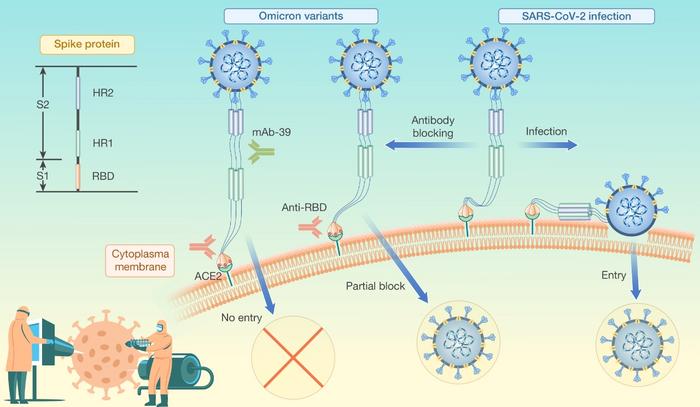The ongoing COVID-19 pandemic caused by SARS-CoV-2 has caused serious damage to public health and the global economy, and one strategy to combat COVID-19 has been the development of broadly neutralizing antibodies for prophylactic and therapeutic use. The most emergency-use authorized (EUA) therapeutic monoclonal antibodies, are more likely to lose their neutralizing activities as the viral epitopes (e.g. the receptor-binding domain, RBD) within spike protein of SARS-CoV-2 they target are more prone to mutate. By contrast, the S2 subunit of spike protein, has a much lower frequency of mutation than the RBD and exhibits a high degree of homology among human SARS-like CoVs. As such, developing antibodies targeting the more conserved S2 epitopes are able to exert an incredibly broad neutralization spectrum against SARS-like CoV viruses.

Credit: Suping Zhang, Shenzhen University
The ongoing COVID-19 pandemic caused by SARS-CoV-2 has caused serious damage to public health and the global economy, and one strategy to combat COVID-19 has been the development of broadly neutralizing antibodies for prophylactic and therapeutic use. The most emergency-use authorized (EUA) therapeutic monoclonal antibodies, are more likely to lose their neutralizing activities as the viral epitopes (e.g. the receptor-binding domain, RBD) within spike protein of SARS-CoV-2 they target are more prone to mutate. By contrast, the S2 subunit of spike protein, has a much lower frequency of mutation than the RBD and exhibits a high degree of homology among human SARS-like CoVs. As such, developing antibodies targeting the more conserved S2 epitopes are able to exert an incredibly broad neutralization spectrum against SARS-like CoV viruses.
This study is led by Dr. Suping Zhang (Shenzhen University), Dr. Zhenhong Lin (Chongqing University), and Dr Lanfeng Wang (Shanghai Institute of Immunity and Infection, Chinese Academy of Sciences). They isolated one neutralizing mAb, called mAb-39, against SARS-CoV-2 and its variants from convalescent adult. This mAb exhibited good potency in neutralization SARS-CoV2 original strain, previous and current circulating Omicron variants (e.g. Omicron BA.1, BA.2.86, BA.4, BA.5, EG.5.1) in a cell-based assay.
This antibody binds to a highly conserved new epitope on the glycoprotein from SARS-CoV2. “This is very exciting!” Dr. Hang Su says, “The good activity and highly conserved epitope of this antibody suggested its potential for clinical translation”.
The team found the mAb-39 greatly improved the neutralizing activity of anti-RBD antibody, the same type of EUA therapeutic monoclonal antibodies, against the highly neutralization-resistant Omicron variants. The study also extended the knowledge to the neutralizing and protective epitopes of SARS-CoV-2.
See the article:
A human monoclonal antibody neutralizes SARS-CoV-2 omicron variants by targeting the upstream region of spike protein HR2 motif
Doi: 10.1016/j.hlife.2023.09.003
Journal
hLife
DOI
10.1016/j.hlife.2023.09.003
Article Title
A human monoclonal antibody neutralizes SARS-CoV-2 Omicron variants by targeting the upstream region of spike protein HR2 motif
Article Publication Date
9-Feb-2024




